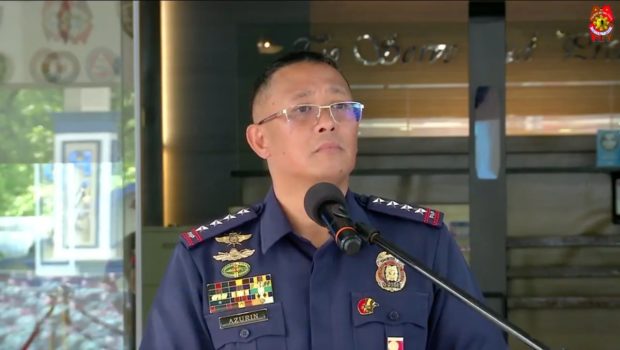
Philippine National Police (PNP) chief Gen. Rodolfo Azurin Jr. FILE PHOTO
MANILA, Philippines – Killing criminals instead of putting them behind bars would be a much easier option for them as it spares them from suffering retribution, said Philippine National Police (PNP) chief Gen. Rodolfo Azurin Jr.
Asked about his comment on Senator Ronald “Bato” Dela Rosa saying police officers nowadays do not seem as aggressive in their crackdown on criminality – especially after recent reports of kidnapping incidents, Azurin said he has “high respect” for the former PNP chief-turned-lawmaker, but he reiterated that it is the mandate of police officers to ensure safety instead of promoting fear.
“For me kasi, the very reason why sinasabi natin that we value the preservation of life and that hindi po natin kailangan pagtatakutin ang ating mga kriminal, because very clear naman po ang guidance ng ating Presidente — to make this country a safe place whether they are inside or outside their home,” he said in a press briefing on Monday.
(For me, the very reason why we say we value the preservation of life and there is no need to instill fear among our criminals is that this is the government’s instruction – to make this country a safe place whether they are inside or outside their home.)
The country’s top cop also argued that police forces should investigate crimes, identify suspects, file complaints, and ascertain jail time for criminals instead of resorting to violence or killings.
“Ang aking pananaw diyan ay kapag ang isang kriminal, pinatay mo na, we just ended iyong suffering niya at an instant. But when we start investigating, filing cases, arresting these criminals and placing them behind bars, if they still have 30 years to live in this world, sa araw-araw po na paggising nila, araw-araw nilang pagsisisihan ang krimen na nagawa po nila sa ating taumbayan,” he further explained.
(In my perspective, if you kill a criminal, you only end their suffering instantly. But when we start investigating, filing cases, arresting criminals and placing them behind bars, if they still have 30 years to live in this world, they’ll wake up every day, regretting the crime they committed against others.)
When the time comes that the criminals are pardoned, or their set punishment comes to an end, Azurin said they will now have a choice to either go back to their old ways and risk being caught again or change their way of living.
But with police officers using violence toward others, including criminals, Azurin restated that it should only be done in instances of self-defense.
“Kapag ang kriminal ay lumaban, very basic naman po siguro iyon na tatanggapin na lang ba ng ating pulis iyong mga bala? Definitely, they also have to defend themselves pero iyong tayo pa ang mag-instigate, huwag naman. Huwag naman, because hindi iyon ang mandato natin bilang pulis,” Azurin added.
(If a criminal fights back, it’s very basic. Should cops just accept the bullet? They would definitely have to defend themselves, but if we instigate violence then, no. We shouldn’t do that, because it’s not within the mandate of the police.)
During the term of former President Rodrigo Duterte, his bloody war on drugs left at least 6,200 drug suspects killed in official police operations as of May 2022, according to the government’s Real Numbers data.
But human rights groups have pegged this figure to be higher, considering deaths attributed to vigilantes and fights among drug dealers.
‘No real comparison’
On the continuation of the campaign against illegal drugs, Azurin said there should be no comparison with how it was previously implemented by the erstwhile administration.
But he pointed out that the focus of the government’s war on drugs should now shift to preventing deaths and raising public knowledge about drug rehabilitation options.
“Sabi ko nga, we cannot compare apples to oranges. There’s no real comparison. Ang sinasabi ko lang, we are trying to raise the bar doon sa ating war on drugs na kung saan, natapos na kasi tayo sa stage na iyon eh. Kaya kung mapapansin mo iyong ating campaign sa drugs, nasa rehabilitation and education na tayo,” he said.
Citing his recent meetings with drug enforcement bodies in other southeast Asian countries like Indonesia, Azurin said they found out that the confiscated drugs in both countries had the same packaging.
“Ibig sabihin, iisa lang iyong source na pinanggagalingan ng droga at iisa lamang po iyong tinutumbok natin. That’s why with the advent of technology, crimes now became borderless among our Association of Southeast Asian Nations (Asean) countries,” he said.
(This means they only had one source of drugs, and we’re only going after one major drug player. That’s why with the advent of technology, crimes now became borderless among our Association of Southeast Asian Nations [Asean] countries.)
With this, Azurin vowed to establish good ties with other countries in combating not just the Philippines’ problem on illegal drugs, but also other crimes involving other nations.
He clarified that using violence in police operations is not being restrained by the looming threat of investigations by international courts on the crimes against humanity, which were purportedly committed in Duterte’s term.
“Ang sa atin, mas maganda na ma-educate po ang mga komunidad tungkol sa droga dahil itong droga, it became a very lucrative business. Kaya kailangan alam ng bawat Pilipino ang masamang epekto ng droga once sila po ay nalulong, sila po ay nagbebenta at sila po ay nagfi-finance ng illegal na droga dito sa ating bansa,” he said.
(For us, it would be better to educate the community about drugs, which has become a very lucrative business. Every Filipino must know the consequences of drug addiction, trade, financing and other activities involving the illegal substance.)
RELATED STORIES:
Days before Duterte admin leaves, over 25K barangays cleared, 10K still drug-infested
PNP to help 30 cops indicted for ‘Bloody Sunday’ slays